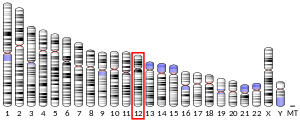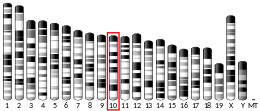ACSS3
Acyl-CoA synthetase short-chain family member 3 is a protein that in humans is encoded by the ACSS3 gene.[5]
| ACSS3 | |||||||||||||||||||||||||
|---|---|---|---|---|---|---|---|---|---|---|---|---|---|---|---|---|---|---|---|---|---|---|---|---|---|
| Identifiers | |||||||||||||||||||||||||
| Aliases | ACSS3, acyl-CoA synthetase short-chain family member 3, acyl-CoA synthetase short chain family member 3 | ||||||||||||||||||||||||
| External IDs | OMIM: 614356 MGI: 2685720 HomoloGene: 11587 GeneCards: ACSS3 | ||||||||||||||||||||||||
| |||||||||||||||||||||||||
| |||||||||||||||||||||||||
| |||||||||||||||||||||||||
| Orthologs | |||||||||||||||||||||||||
| Species | Human | Mouse | |||||||||||||||||||||||
| Entrez | |||||||||||||||||||||||||
| Ensembl | |||||||||||||||||||||||||
| UniProt | |||||||||||||||||||||||||
| RefSeq (mRNA) | |||||||||||||||||||||||||
| RefSeq (protein) | |||||||||||||||||||||||||
| Location (UCSC) | Chr 12: 80.94 – 81.26 Mb | Chr 10: 106.93 – 107.12 Mb | |||||||||||||||||||||||
| PubMed search | [3] | [4] | |||||||||||||||||||||||
| Wikidata | |||||||||||||||||||||||||
| |||||||||||||||||||||||||
Function
ACSS3 is part of a family known as Acyl-coenzyme A synthetases (ACSs), which catalyze the initial reaction in fatty acid metabolism. This reaction activates fatty acids via thioesterification to CoA, thereby allowing their participation in both anabolic and catabolic pathways. The existence of many ACSs suggests that each plays a unique role, directing the acyl-CoA product to a specific metabolic fate. Knowing the full complement of ACS genes in the human genome will facilitate future studies to characterize their specific biological functions.[6]
gollark: ARM laptops have been a thing for a while. They just weren't very popular, or good.
gollark: If nothing else, they have excellent CPU designers.
gollark: And it *is* ubiquitous in high-power platforms; Intel just messed up entry into mobile. I don't know exactly why. Possibly the lack of ability to include x86 cores in custom designs.
gollark: AMD had a terrible architecture for ages and didn't fix it until Zen.
gollark: Intel was sandbagging a lot due to low competition and also got apified by process issues.
References
- GRCh38: Ensembl release 89: ENSG00000111058 - Ensembl, May 2017
- GRCm38: Ensembl release 89: ENSMUSG00000035948 - Ensembl, May 2017
- "Human PubMed Reference:". National Center for Biotechnology Information, U.S. National Library of Medicine.
- "Mouse PubMed Reference:". National Center for Biotechnology Information, U.S. National Library of Medicine.
- "Entrez Gene: Acyl-CoA synthetase short-chain family member 3".
- Watkins PA, Maiguel D, Jia Z, Pevsner J (Dec 2007). "Evidence for 26 distinct acyl-coenzyme A synthetase genes in the human genome". Journal of Lipid Research. 48 (12): 2736–50. doi:10.1194/jlr.M700378-JLR200. PMID 17762044.
Further reading
- Hunter AM, Leuchter AF, Power RA, Muthén B, McGrath PJ, Lewis CM, Cook IA, Garriock HA, McGuffin P, Uher R, Hamilton SP (Sep 2013). "A genome-wide association study of a sustained pattern of antidepressant response". Journal of Psychiatric Research. 47 (9): 1157–65. doi:10.1016/j.jpsychires.2013.05.002. PMC 3710535. PMID 23726668.
- Watkins PA, Maiguel D, Jia Z, Pevsner J (Dec 2007). "Evidence for 26 distinct acyl-coenzyme A synthetase genes in the human genome". Journal of Lipid Research. 48 (12): 2736–50. doi:10.1194/jlr.M700378-JLR200. PMID 17762044.
This article is issued from Wikipedia. The text is licensed under Creative Commons - Attribution - Sharealike. Additional terms may apply for the media files.



